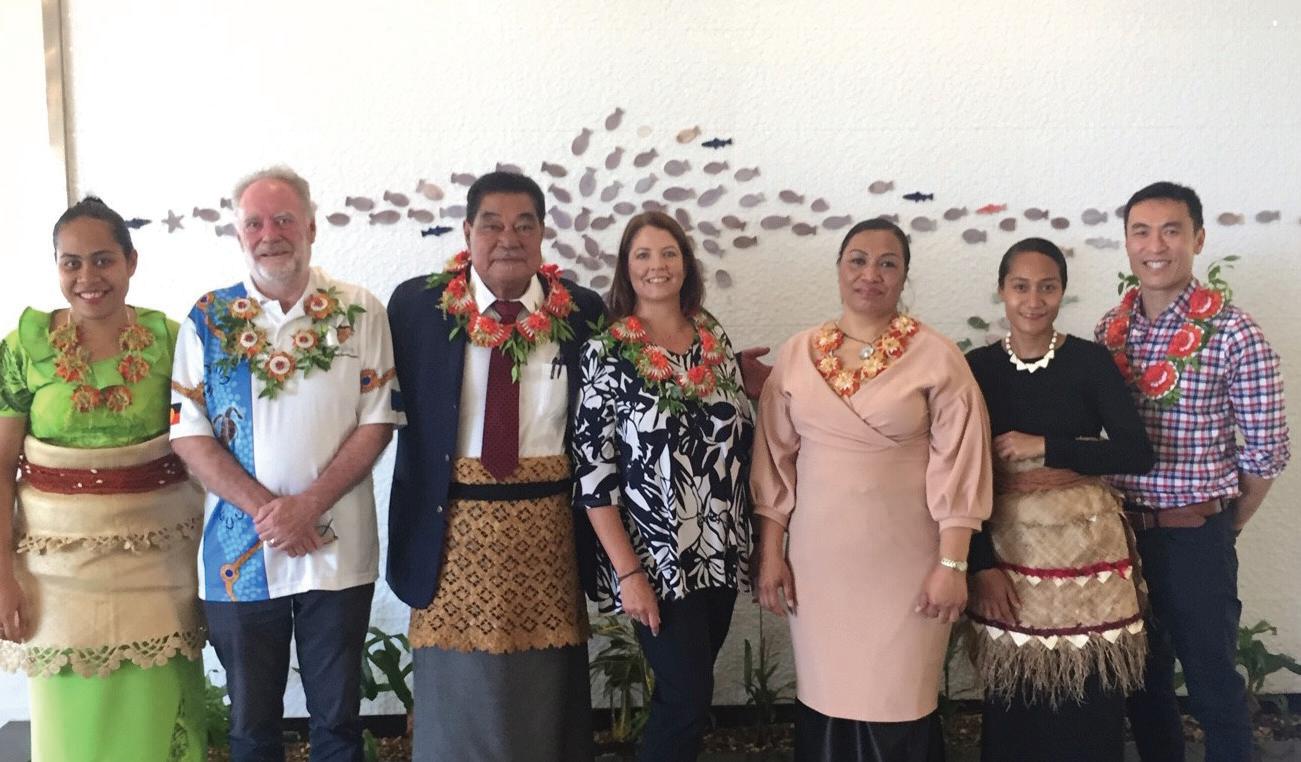
5 minute read
Preventing hearing loss in Tonga
Preventing ear disease and hearing loss in Tonga
Dr Sepiuta Lopati is working to introduce screening and early intervention for childhood ear disease in her home country. Imagine 172 islands floating in the turquoise water of the Pacific where, every year from July to October, hundreds of humpback whales swim 6000 kilometres from Antarctica to give birth and mate. It’s a remarkable cycle that sees whale calves born where they were conceived the previous year, and Tonga is one of the few places in the world where humans can swim with these giant, gentle creatures. This is Dr Sepiuta Lopati’s heritage. But like most Pacific Islanders wanting to study medicine, she had to travel to the Fiji School of Medicine to complete her training. After graduating in 2003, she returned to Tonga to complete her internship and was provided with three specialty choices: radiology, pathology or ENT (ear, nose and throat). She chose the latter, she said, because “at that time there was only one ENT surgeon in the whole of Tonga,” although since then others have come onboard to provide medical care for the population of 110,000 people. Ear disease is a common problem in Tonga, especially in children, and that is one of the focuses of Dr Lopati’s work. It’s not easy, she said, because “there’s little awareness or education about ear health”, and the only time the medical staff are able to educate parents or collect data is when the families come into the clinic. The most common ear problems in children in Tonga are acute and chronic otitis media, wax build-up in children’s ears and associated hearing problems. Although these health problems are widespread throughout the outer islands, Dr Lopati said she is unable to focus solely on treating ear disease in her daily practice because she is required to look after all three components of ENT. There’s no ENT training in Fiji for Tongan surgeons, and this leaves Dr Lopati to learn from visiting teams of ENT surgeons from Australia and other countries. “If we have difficult cases and need a team to come to Tonga, we contact the Royal Australasian College of Surgeons (RACS),” she said. “We collect all the patients and the team stays for a week and operates. They also give us training and that way we learn more advanced surgical skills,” she explained. RACS Global Health has been supporting Pacific Island countries through the Pacific Islands Program (PIP) since 1995. It is funded by the Australian Government through the Department of Foreign Affairs and Trade (DFAT). When the PIP commenced, it was almost exclusively clinical service delivery.
Advertisement

Today, activities focus on workforce planning, continuing professional development and clinical governance. RACS Global Health works closely with Pacific Island Ministries of Health, facilitating their ownership of the PIP goals for their specific country priorities. In addition to further training through visiting teams, Dr Lopati travels to countries, such as Australia, to undertake advanced surgical training. She was recently in Australia studying for her Master of Surgery – Research degree at the University of Melbourne, where her supervisor was Professor Stephen O’Leary, the William Gibson Chair of Otolaryngology. Dr Lopati’s masters research included three weeks of collecting data on ear disease and hearing loss from about 600 children in Tonga. It is the first survey of its kind to include children from the rural area of Tongatapu, and Dr Lopati and her University of Melbourne colleagues hope their study will identify the extent of the problem and contribute to ongoing health service planning in Tonga. In July she completed her masters and headed back to Tonga to continue her surgical work. Dr Lopati’s hopes for the future include integrating a primary hearing health service into the existing system in Tonga so that early diagnosis of ear disease in children, screening and awareness education are part of the ongoing medical program. Waiting for children to present at the clinic at Vaiola Hospital is not ideal, she said. “The kids have to come by boat and some of them have had very complicated ear problems.”
Education courses update
On 3 March this year, Dr Lopati was involved in organising Tonga’s first World Hearing Day. Representatives from Australia, New Zealand and China attended, as well as the Tongan Minister for Health. To coincide with this event, RACS Global Health, under the Australian NGO Corporation Program (ANCP) grant from the Australian government (DFAT), was able to support the procurement, delivery and training of a number of pieces of vital ENT medical equipment to assist efforts in combating ear disease in the Tongan population. It was a tremendous day that involved an awareness program about ear health with attendance by the local medical community who, no doubt, were very impressed by Dr Lopati’s work in the prevention of ear disease and hearing loss in their country.
Education at Royal Australasian College of Surgeons is aiming to recommence from September 2020, for both prevocational and professional development courses. Some previously scheduled courses may not go ahead; however, our Education Services teams are working hard to run as many courses as possible. If you are registered for a course, the program coordinator will be in touch to confirm details. Course registrations will open on Friday 14 August. For more information, visit the RACS courses coronavirus (COVID-19) FAQs in our COVID-19 information hub.
Educator Studio Sessions – Webinars
Each month, the Academy of Surgical Educators presents a comprehensive schedule of education events curated to support surgical educators.
The Educator Studio Sessions deliver topics relevant to, and beyond, the surgical education sphere to help to raise the profile of educators. They provide insight, a platform for discussions and an opportunity to learn from experts.
Register for webinars here.
Course A surgeon reflecting on insight Developing a spine surgery training program using EPAs Start Date Thursday 27 August 2020 Wednesday 23 September 2020 Speaker Dr Neil Price Dr Bryan Ashman







